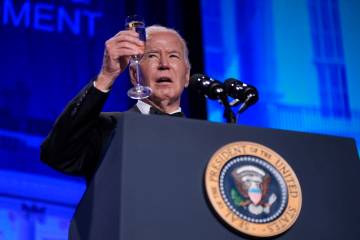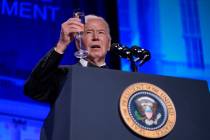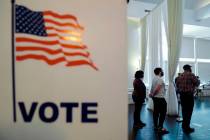House passes measure to block student loan rule changes
A bill aiming to preserve Obama-era protections for students defrauded by higher education institutions passed the House of Representatives on Thursday.
House Joint Resolution 76, which passed with the support of 225 Democrats and six Republicans, would block changes to the “borrower defense” rule from going into effect in July. Critics have said these changes would create an undue burden on students in part by rescinding a provision making all students eligible for debt relief if a school closes.
They would instead be forced to file individual claims against schools that they believe lied to them about the quality of their education, transferability of credits or future employability.
“They would have to hire their own lawyers to get relief, and prove that they were not only lied to, but that the school had intent to lie,” said Rep. Susie Lee, D-Nev., who sponsored the bill to block the changes.
Other changes made by the Department of Education include offering students an option to transfer to another school as an alternative to debt relief and restoring colleges’ ability to implement arbitration agreements.
Last year, a federal judge blocked the Department of Education from processing partial debt relief claims from former students of the defunct Corinthian Colleges that would have been calculated based on their current income.
A White House statement issued before Thursday’s House vote said the bill would restore “the partisan regulatory regime of the previous administration, which sacrificed the interests of taxpayers, students, and schools in pursuit of narrow, ideological objectives.”
Department of Education spokeswoman Angela Morabito added that it was surprising to hear the changes to the borrower defense rule described as friendly to for-profit schools when they apply to for-profit and nonprofit schools alike.
“The rule corrects the overreach of the prior administration, gives students and borrowers the relief that they’re owed, and restores fairness and due process, saving taxpayers $11.1 billion over 10 years,” Morabito said in a statement. “Additionally, the rule helps students by extending the closed school loan discharge window from 120 days to 180 days and encourages closing institutions to allow students to complete their programs.”
A companion Senate bill introduced by Sen. Dick Durbin, D-Ill., was referred to the Senate Health, Education, Labor and Pensions committee last year. The joint resolution is unlikely to become law even if it passes the Senate, as it would face a potential veto from President Donald Trump.
In an interview with the Las Vegas Review-Journal, Lee said she was once an “unsophisticated buyer of education,” and she worries particularly about first-generation students being duped by unsavory institutions.
“I imagine when I got a pamphlet in the mail from a school about its accreditation, I assumed it was true,” Lee said.
Lee added that the Obama-era version of the rule put triggers in place to protect taxpayer interests by requiring schools whose borrower defense claims met a certain threshold to obtain a line of credit.
Nevada has seen dozens of for-profit schools close in the last decade, with the latest being the Art Institute of Las Vegas, a former Dream Center Educational Holdings school that closed in December after a year of uncertainty. Studies have also found that the state has one of the highest student loan default rates in the nation.
“Predatory schools have been at the center of scandals for decades,” Lee said. “This is really about students who were cheated and lied to by big companies making profits.”
Contact Aleksandra Appleton at 702-383-0218 or aappleton@reviewjournal.com.























